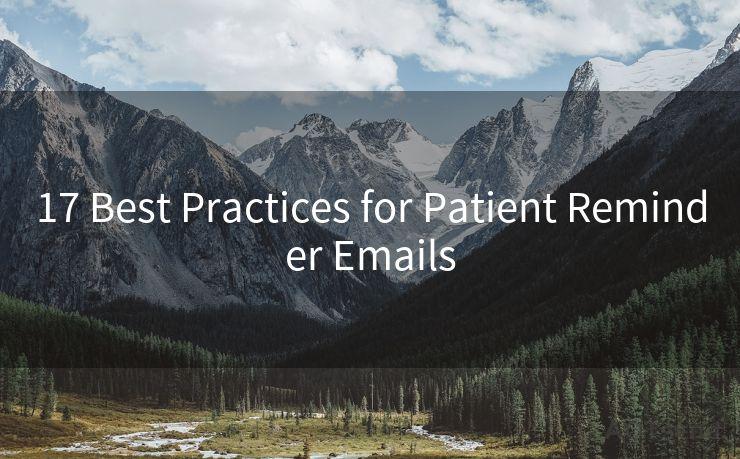17 Best Practices for Patient Reminder Emails




In the healthcare industry, effective communication with patients is crucial. Patient reminder emails play a significant role in ensuring that patients don't miss their appointments, follow medication schedules, or forget important health advice. Here are 17 best practices for crafting patient reminder emails that get results.
1. Clear and Concise Messaging
Your email should convey the essential information quickly and clearly. Avoid jargon or complex medical terms that might confuse the reader.
2. Personalization
Use the patient's name in the greeting and throughout the email to create a sense of familiarity and importance. Personalization increases the likelihood that the message will be read and remembered.
3. Professional Tone
Maintain a professional and respectful tone in your emails. Avoid colloquial language or slang, as this might detract from the seriousness of the message.
4. Appointment Details
Include the date, time, and location of the appointment prominently in the email. Consider using bold or larger font sizes to highlight this information.
5. Reminder Purpose
State clearly why you're sending the reminder. Whether it's for a routine check-up, a follow-up visit, or a specific procedure, make sure the patient understands the purpose of the appointment.
6. Instructions and Preparation
Provide any necessary instructions for the appointment, such as bringing specific documents, fasting, or wearing loose clothing. This helps the patient feel prepared and reduces anxiety.
7. Contact Information
Include your contact information or a link to the healthcare facility's website for any additional questions or concerns the patient might have.

8. Privacy and Security
Ensure that all patient information is handled securely and in accordance with HIPAA regulations. Avoid sending sensitive health information in the email body; instead, direct patients to a secure portal to access their details.
9. Call to Action
End the email with a clear call to action, such as confirming the appointment, rescheduling if necessary, or preparing for the visit.
10. Timely Delivery
Send the reminder email a few days before the appointment to give the patient enough time to prepare. Avoid sending reminders too close to the appointment date, as this might cause undue stress.
11. Mobile-Friendly Design
Ensure that your emails are mobile-friendly, as many patients check their emails on their smartphones.
12. Unsubscribe Option
Include an unsubscribe option for patients who no longer wish to receive these reminders, as per email marketing best practices.
13. Testing and Optimization
Regularly test your emails to ensure they render correctly on different devices and email clients. Optimize based on user feedback and analytics data.
14. Accessibility
Consider accessibility standards when designing your emails. Use high-contrast colors, alt text for images, and clear, simple language.
15. Follow-Up After the Appointment
Consider sending a follow-up email after the appointment to check on the patient's well-being and gather feedback on their experience.
16. Integration with Other Communication Channels
Integrate your email reminders with other communication channels, such as SMS or push notifications, for a multi-channel approach that increases reach and effectiveness.
17. Tracking and Analytics
Utilize tracking and analytics tools to measure the performance of your emails. This data can help you refine your strategy and improve future campaigns.
🔔🔔🔔
【AOTsend Email API】:AOTsend is a Managed Email Service for sending transactional emails. Support Email Types: reminders, authentication, confirmations, notifications, verification codes, invoices, password resets, account activations, billing statements, two-factor authentication (2FA), and one-time passwords (OTP) emails, etc. $0.28 per 1000 Emails. 99% Delivery, 98% Inbox Rate.
You might be interested in:
Why did we start the AOTsend project, Brand Story?
What is a Managed Email API, How it Works?
Best 25+ Email Marketing Platforms (Authority,Keywords&Traffic Comparison)
Best 24+ Email Marketing Service (Price, Pros&Cons Comparison)
Email APIs vs SMTP: How they Works, Any Difference?
By following these 17 best practices, you can create patient reminder emails that are effective, efficient, and respectful of your patients' time and privacy. Remember, clear and timely communication is key to ensuring a positive healthcare experience for your patients.




Scan the QR code to access on your mobile device.
Copyright notice: This article is published by AotSend. Reproduction requires attribution.
Article Link:https://www.mailwot.com/p3501.html



